- Home
- George Zebrowski
Macrolife Page 4
Macrolife Read online
Page 4
For a wild instant this morning, she had dreamed that Jack would send her a confidential record of his declaration as a surprise. She turned from the rail and walked toward Orton.
“I’m thinking of all the work on my desk,” he said, shifting as she came near. He’s trying to avoid the subject. She sat down on the cushion at his right and listened to the music.
Orton was too good to be governor, she thought. He had not assumed the job from any of the usual motives, but he did it well. He had taken all the wretched cases during his law practice, finding it difficult to blame anyone but the powerful for social problems; as governor he tried to use the public trust of wealth and power to make a difference in individual lives. There were limits to that, he had found.
“You didn’t have to do this,” Orton said.
She looked up at him. “I’m not really disappointed.”
“He did come, after all.”
“To reinforce his own view of himself,” she said. “To have it reported that he was present at the anniversary celebration of Carlos Bulero’s gift to the world.”
She had once toyed with the idea of writing down the truth about Jack, especially after she had learned how little could be proved about the Buleros. The documentary broadcast viewed by the guests earlier tonight had been at least one-third fiction. She had found it difficult to remind herself of the truth after the telecast. That’s because I’m part of the lie.
It was Carlos Bulero, son of a country doctor from a small village in Ecuador, who had made the family rich through his discovery of bulerite—the family element, she thought, common to us all. Carlos had been a major physicist; his son, Jack, had only dabbled in physics, a businessman taking credit for the work of his employed scientists. It was not known outside the family that Jack had altered his father’s records to give himself a large share in the discovery of bulerite and all the credit for the structural applications of the building material. Since all the records were in computer storage, even that much could not be proved, unless Jack produced the written records, but he denied their existence; only Sam had claimed, privately, to know what was in them. Carlos had not cared much for publishing his results.
In recent years, control of the Bulero multinational had begun to slip away from Jack, but he did not seem to care as long as he was not deprived of his wealth, fame, and influence. She looked at Jack’s face, noticing the sudden loss of confidence, as if Sam had said something cutting. Gone was the smugness that she had seen at the financial meeting, where she had given her annual report as internal-program auditor. He looked up, noticed her scrutiny, and turned his back as he answered Sam, producing a dead spot in her feelings. To reveal the truth about Jack would make no difference, except as a matter of curiosity; the Bulero stock might dip a point, Jack would issue a denial, and the incident would be forgotten.
There was not much that Jack could do to her; her share of the wealth was safe. No one would object if she chose to do nothing for the rest of her life; with new interests coming into the company, she doubted if she would be missed. She was good at her job, but others were just as good. As Jack was fond of saying, the Buleros had done their bit for the world and should be permitted to live as they pleased.
She had never thought of it in overly dramatic terms, but in a very real sense the skeleton and much of the sinew of the present world had been born in a Bulero brain; that much of the documentary had been true. In the final years of the last century, amid famine and ecocrises, the world had been rebuilt; not perfectly, not completely, but well enough for a new start. The richer nations had divided themselves into ecologically manageable provinces and had built new cities—upward. The open towers, cubes, and pyramids were shelf like latticeworks, into which the remains of the old cities had been moved, preserving the best of the older architectures. She liked to think that there was something of ancient Inca strength in bulerite. Among the superstitious rich, the dream substance had long ago replaced copper and bronze as a material for bracelets and chains.
Every major human settlement in sunspace—-on earth, on the moon, Mars, the satellites of Jupiter and Saturn—was built up with the virtually indestructible material, which could be prefabricated into parts of any shape and size, and fitted together permanently on contact.
Abandoning the two-dimensional spread of twentieth-century cities, arcologies housed up to a million people comfortably on a thousand-acre base, in varied structures rising more than a mile into the sky, leaving the countryside to renew itself. Waste was removed through giant vertical chutes, letting the passive action of gravity do the work of carrying it to underground processing plants; these were now fusion torches, vaporizing everything into atoms of pure elements, the ultimate in the recycling of nonrenewable raw materials, while providing clean energy at the same time. Planet-scarring activities such as strip mining, forestry, coal mining, and oil drilling had been cut down to sane proportions. Every decade saw the building of fusion-powered arcologies in the world’s needy areas. Janet knew the whole success story; no one in Bulero Enterprises was ever permitted to forget it.
But still, the world belonged to North America, EuroSov, and Japan. They continued to keep AfroAsia and South America down to mid-twentieth-century levels, as much as that was possible. Properly developed, this other world could easily become their equal. The documentary had avoided this point, ignoring the inevitable, even desirable, conclusion as to the world’s direction. The lines had been drawn and redrawn throughout her life, always to include more of the world in the center of influence, always modifying the dominant cultural styles. As the world’s wealth had increased, the inducements to be destructively greedy had grown weaker. The old middle was now the bottom; the old top was now the middle; and the top might one day, with luck, be the whole future. Only power was still hoarded, subtly, with a few traces of wisdom, she thought.
Nevertheless, she could not help feeling pride. It was the peace of the West that had made the world stable, the culture of the West that had led to science and the ideals of democracy (though not yet to democracy itself); it was the West that had given out its riches, however reluctantly, and was now drawing the world into an economic involvement which would lead to an energy-rich sunspace by the end of the century. Perhaps by then the national pride she felt would be harmless, and power without accomplishment meaningless.
Mike Basil, the research chief of Bulero Enterprises, entered the room below. He went up to Jack and whispered something in his ear. Jack waved him away impatiently. Basil walked around the sofa and sat down next to Richard.
Her son would have been a prince in another time, she thought, noting the look of deference in Mike’s face as he tried to make conversation.
There was a grim expression on Sam’s face, the look of a university professor who had failed to convey his view of things to a student. Sam was usually content with personal rewards, the satisfactions of his theoretical work, with seeing those he had taught go on to success in the world. She felt the strain between the two brothers, who had been talking for two hours behind the sofa and for an hour before in the kitchen. They rarely met outside of family occasions. Sam had never visited the company headquarters, and Jack avoided meeting Sam at Princeton. They’re each other’s judges, she thought, and they accept it.
She could no longer feel what Jack was like inside. The last time she had been able to do so had been at Christmas twelve years ago; and before that when he had been a young man. The thought turned into fear, and then into a quiet panic. She wanted him to run up the stairs to her and say anything to show that he was still the person she had known. “It’s still me inside, Janet” she imagined him saying. “Don’t you know me?”
But Jack was opaque, vague, a scarecrow making fragmented gestures. She stared at him carefully now, almost with an astonished good humor, and still he would not look up. For a moment she believed that he could make all his pretenses real, simulate anything, appear in any way he wished; there was no safe way to e
xpose him.
Wealth held the family together and freed them all from one another. It was easy to be polite and cheerful at a distance. Suddenly looking back, she trembled on the edge of hatred; the world was a dungeon around her, with walls of family and fear.
She looked up at the haze of blue smoke hanging over Orton. The circulating air was slowly whipping the top of the cloud away as the Beethoven quartet rushed toward a frenzied finale.
Jack Bulero finished his drink and put the glass down on the server. “Go on.”
Sam looked up at him. “Who in Bulero is doing any research into bulerite? I’ve read about dozens of theories for its properties—all published by outsiders. Carlos died a curious man, Jack, and you’ve done nothing to carry on his basic research.”
Sam had not called him by his first name in a long time. “The theory is good enough to work—we’re doing fine.”
“But the work is unfinished,” Sam said. “The whole scientific community agrees that the theory is inadequate, and it’s not just the difficulty of the problem that is stopping you. What worries me is that a working-results approach will quickly use up Bulero’s store of knowledge and leave the company with nowhere to go. It’s an approach that belongs to the chaotic growth of the last century.”
“The working-results approach,” Jack said, “also produced solutions to the problems created by chaotic growth. It’s never penetrated to you that we needed the twentieth century’s chaos, its urgent momentum.”
“But the work Carlos left unfinished….”
“Look—you want me to say it: I’m not the physicist our father was.”
“Maybe you could have been.”
“It’s irrelevant. My interest was in doing what Carlos didn’t do. Bulero Enterprises helped reshape the earth. We linked all the human outposts throughout sunspace with fast space haulers made of bulerite. We organized the magnetic-boost train system for the entire hemisphere, as well as making heavy investments in the zero-g manufacturing plants out in space, so we could feed industry with bulerite and basic products. What use would the moon and asteroid resources have been without those factories? Even laser fusion reactors need bulerite casings. At the moment we cannot create the conditions needed to experiment with bulerite. It’s not a research toy any more. Do you know what it would cost?”
“No.”
“We would need a whole community of scientists far out in space, where the work would pose no danger. To study bulerite’s properties requires the control of extreme states of matter, and that takes vast amounts of energy. It’s all we can do just to make the stuff.”
Twenty years out of my life, he thought. The present world would have been delayed by decades if he had not decided to apply bulerite on an industrial scale. He deserved the power and privacy of his life, and he resented his younger brother for provoking these self-justifications. Sam was a withdrawn university type, despite his fame in philosophy—a powerless man who knew nothing of industry and business. He can’t intimidate me, Jack thought.
“The technology of bulerite,” Sam said, “hasn’t been around long enough. It makes me uneasy to see the ignorance in which we run our world.”
“You’re so damn sure of yourself—sorry we can’t tidy up all the books for you.”
“It’s easy to see that you’re whistling in the dark.”
“You want perfect theories and comprehensive explanations—.”
“Come off it, Jack. Sure, we can’t be omniscient overnight, but we can do more basic research, worry more about the dangers in our technologies, distinguish more between what we can do without understanding and what we can do with understanding.”
“What dangers? We’ve cleaned up our technology, or haven’t you heard?”
“How many industrial deaths in Bulero last year?”
There was a sudden quiet between them.
Jack laughed. “Sam—reading about the problems of the last century has scared the crap out of you. Maybe the world is safer because we’re doing fewer new things, because we’re developing a long-considered technology. You’re the one who wants new things.”
“No. I don’t mind a slower pace of innovation and application. I’m calling for a better understanding in the one area of application where it is obviously lacking.”
“Only one?”
“The greater the complexity of our technology, the more pervasive our applications without a sound theory, the greater will be the collapse if something goes wrong. Just consider the air and water processing plants we needed, the cost of dismantling the fission plants….
“They patched us through until we got fusion and solar sources,” Jack said. “Take the cry over the finiteness of earth’s resources—we blew that problem away when we moved out into space and changed over to an energy currency. Earth will now get more than it needs in energy. Everyone will get a chance at a decent life, and the point of world affluence comes long before the moment when we’ll be putting too much generated heat into the biosphere. You’re not going to throw that old bone at me?”
Jack felt the void between them, the years of unexpressed disdain and false goodwill. Sam and Janet seemed to share a snide solidarity against him. He felt his own hatred of them, seeing its shabbiness at the same time; it was a trembling thing inside him, and he was afraid of it.
“Are you feeling well?” Sam was looking at him. Jack stood up straighter. He was not going to show weakness in front of the bastard.
“I’m fine.” He forced a smile. I’m an intruder, he thought as he glanced around the room. He peered up at Janet, but she did not notice him as she looked down at her son. She doesn’t even remember that today is the end.
Jack leaned over and tapped Mike Basil on the shoulder. The executive turned and gazed up at him earnestly.
“Good-bye, Sam,” Jack said. He sought out Janet again, but she was not looking at him.
Richard was saying good-bye to him distantly. Jack turned unsteadily and walked out into the kitchen and out the back door. Basil was behind him, rushing to keep up.
The night air was cool and dry. The hovercraft was a huge insect waiting for him on the lawn, menacing him with its lights. He almost expected it to rear up and tear him to pieces like some huge mantis.
He walked across the dark grass and climbed into the creature’s belly. Basil followed him, sitting down on the facing seat as the door slid shut.
Jack closed his eyes and leaned back. In the morning he would be on his yacht, far away from the family he had outgrown.
The charade is over again, Orton Blackfriar thought. He took a long pull on his cigar and let the smoke out. Richard was alone on the sofa. Sam was finally mixing himself a drink at the bar by the far wall. Jack had been too much for him. Janet sat on the cushion next to him, her thoughts painfully evident.
Richard got up. His expression was one of contained exasperation as he turned and went out through the side door.
Sam turned, toasted the air, and gulped down half his drink. Janet rose and leaned over the railing. “He panicked this time,” she shouted.
“May he enjoy the company of his flunkies,” Sam said, and finished his drink.
Janet still managed to fill her jumpsuit quite well, Orton noted. At another time he might have loved her, but no one could ever replace Evelyn. “There are concerns more important than personal ones,” she had often said. He felt closer to her when actively following her advice.
There were a number of worthy dreams searching for workers. The interstellar group had contacted him more than once. Despite the disappearance of the Centauri sublight starship more than twelve years ago, the dream of exploring beyond sunspace had not died. The optimists still believed that the expedition was merely late. His reputation as a state governor had attracted the group’s interest, but they had been delighted to discover that he was a gifted administrator and lawyer who shared their dreams. He would not be at a loss when his last term ran out.
He wondered for a moment why Janet
was so cautious with Sam, why they did not live together openly. She was cautious, perhaps, for no reason other than that Sam was Jack’s brother. Suddenly he inhaled some smoke and started coughing.
“Silly,” Janet said as she turned around and looked at him with her large brown eyes. She took the cigar from him and dropped it in the floor slot. “Orton, have you replaced that old heart yet?”
“Works well enough for a loveless man.”
Her smile turned to a look of concern. “I’m serious—retire that tin lizzie.”
The idea of growing a clone of his heart made him uneasy. The collagen enzyme treatments that cleaned out his aging, hard-boiled proteins were not so bad, but the replacement of his organs by using cells from embryonic twins disturbed him at times. Material drawn from his embryonic clone would be injected into him, slowly replacing him, until a complete cell change of his body was finished, continuing a process that stops in the body after a certain age; the unborn clone, of course, would die. He might double his life span, as many were already doing. The procedure was as objectionable as abortion had been in the last century, and for that reason he would be happier when individual organs could be grown without embryos; still, the process had eliminated the heartbreak of waiting for suitable donors, as well as the problem of tissue rejection. One day, the risks of cloning from existing body cells would be eliminated. The DNA code for an individual would be read directly, and the cells made fresh out of raw materials, for use in growing replacement parts or for growing a whole individual as an alternate method of reproduction.
“A natural heart wouldn’t work hard enough,” he said, “to support my large frame and eating habits. I’d wear the poor critter out, just like the last one. This old atomic will do well enough, even though it’s not as subtle as the organic one—it goes a shade too fast when I get excited, and too slow at times, and it makes my face red when I look at you. Besides, I’m waiting for better techniques.”

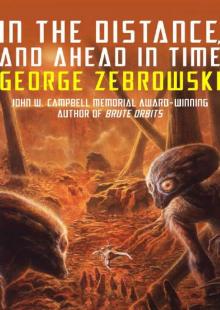 In the Distance, and Ahead in Time
In the Distance, and Ahead in Time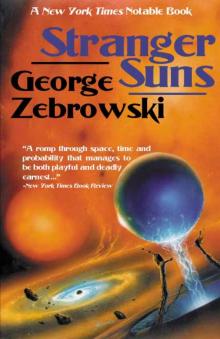 Stranger Suns
Stranger Suns Black Pockets
Black Pockets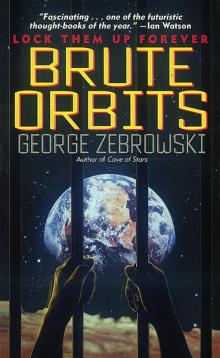 Brute Orbits
Brute Orbits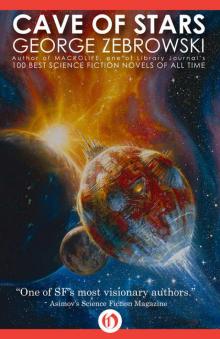 Cave of Stars (Macrolife Book 2)
Cave of Stars (Macrolife Book 2)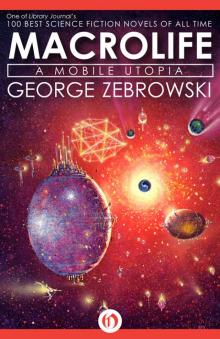 Macrolife
Macrolife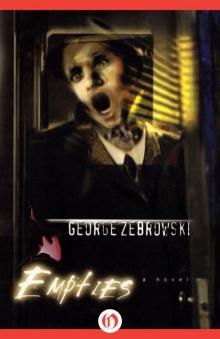 Empties
Empties Heart Of The Sun Star Trek 83
Heart Of The Sun Star Trek 83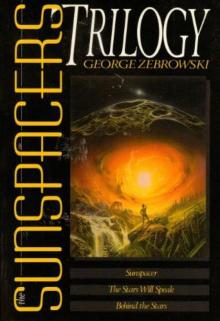 The Sunspacers Trilogy
The Sunspacers Trilogy